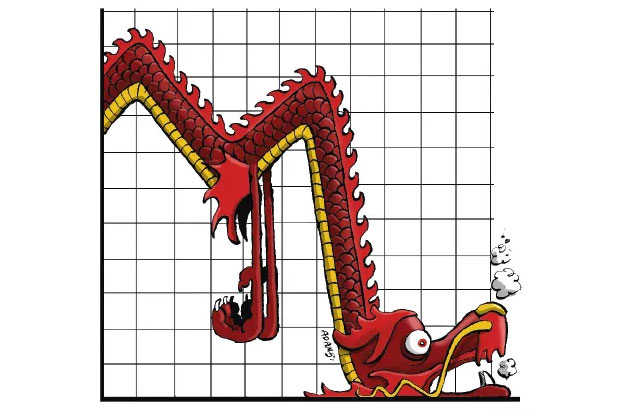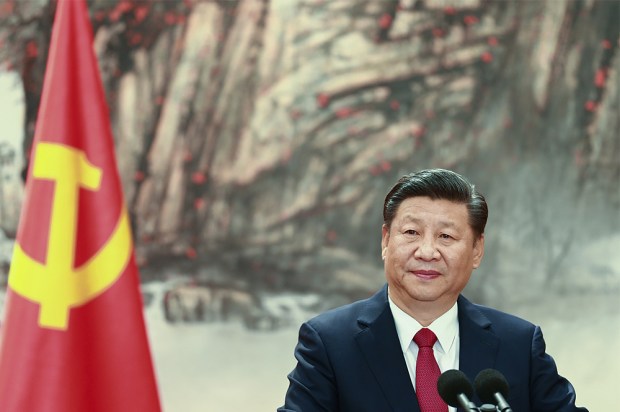Home from the hot Aegean, huddled by the fire as rain ruins the bank holiday weekend, I’m thinking: what gloom has descended since I’ve been away — and doesn’t it call for a round-up of cheerful news? So here goes. The UK economy grew by 0.7 per cent in the second quarter and a respectable 2.6 per cent over the past year. US growth has been revised sharply higher to 3.7 per cent, scotching our claim to be the fastest growing western economy, but George Osborne can still say convincingly that ‘we’re motoring ahead’ — and weak first-quarter performance can be seen as a blip rather than the revelation of doom it was declared to be by Ed (‘Where is he now?’) Balls.
Tax receipts are rising at an annual rate of 4.4 per cent, well ahead of the Office for Budget Responsibility’s forecast. Retail sales volumes are up 4 per cent from last year and have been particularly strong in the clothing sector. Lower than expected energy costs mean more cash left over for consumers to spend. Business investment showed healthy second-quarter growth, as did exports (though a strong pound may be a new threat on that front). Unemployment rose slightly in May and June after a long run of falls — but the narrower count of jobless benefit claimants continued to improve: down 200,000 on a year earlier, at 792,000. Wages have been rising at 2.8 per cent against near-zero inflation, and bonuses have been on an uptrend everywhere except in the financial sector, where they have fallen 10 per cent from last year — a healthy rebalancing. Productivity finally seems to be improving, too, with output rising faster than the number of hours worked.
How much of this progress will be knocked sideways by a global wave of bad news emanating from China? The short answer is less than last week’s headlines were shouting, not least because we’re in much more robust and flexible shape to withstand the shock than most of our competitors. Have I cheered you up? I hope so — but I’ll try to be gloomier next week.
Impervious
I would have sent a ‘good luck’ postcard to Sir Howard Davies, who succeeded Sir Philip Hampton as chairman of Royal Bank of Scotland this week. But Davies never seems to need luck, bouncing as he does from one difficult assignment to the next with the silver–tongued imperviousness of the McKinsey consultant he once was. No mud has stuck from his role as founder chairman of the Financial Services Authority from 1997 to 2003, despite its later failings; nor from his resignation in 2011 as director of the LSE after revelations of its links with Saif al-Islam, son of Muammar Gaddafi, recently sentenced to death in Libya.
As chairman of the Airports Commission, Davies batted off suggestions that he was a stooge who could be relied upon to favour Heathrow expansion, as well as accusations that his directorship of Prudential, a big property investor around Heathrow, constituted a conflict of interest. When Gatwick boss Stewart Wingate accused him of ‘omissions’ and ‘superficial analysis’ in his report — which did indeed favour Heathrow — Davies retorted that ‘using colourful language does not turn weak points into strong ones’. Not a man who finds it difficult to stand up for himself, then.
It will be fun to watch him exercise his sharp wit as mis-selling fines continue to besmirch RBS while its managers wrestle the bank back to profitability and the Chancellor demands a swift sell-off of the taxpayers’ stake. At only 64, Davies probably regards RBS as no more than an interesting project until the next big job comes along.
Sayonara
Sad news from Tokyo: the Okura Hotel is being demolished. Architecture buffs from around the world petitioned in vain to save this 1962 masterpiece of modernism, designed by Yoshiro Taniguchi — but my own regret at its passing is different from theirs. To me, the Okura symbolised the elegant 25-year con-trick played by Japan on western business between the 1964 Tokyo Olympics and the 1990 collapse of the Nikkei index. In essence, it was this: invest massively here, observe our rituals, be patient, and one day you’ll reap a rich reward.
We did as we were told, in my case as a representative of Barclays, but the reward stayed forever out of reach. When our chairman visited, his Okura suite was so inundated with flowers from Japanese companies that he had to move to an even bigger one. When we held a reception in the hotel to celebrate the opening of our office, we were told that potential Japanese clients would judge us by the quality of our hospitality, so we bought the full package of kimono-clad hostesses, ice sculptures and beautiful gifts for guests. I doubt our new operation ever made back the colossal cost of the party, never mind the investment in floor space, computers and hundreds of staff.
But still I admired Japan for the teamwork behind the hustle — corporations and government hand in hand — and the geniality with which it was done. And I admired the Japanese urge for constant renewal, which is why the old Okura is to be replaced by a twin-towered new one, masterminded by Yoshiro Taniguchi’s son Yoshio.
The secret tunnel
I suspect you’d rather hear more Spectator cruise stories than growth statistics. Did I really dance with Jeremy Clarke to Abba’s ‘Lay All Your Love On Me’ in the ship’s nightclub, Hemispheres — which for some reason we renamed ‘Hammersmith’? Yes, I’m told I did. But my abiding daytime memory will be of our visit to the ruins of Ephesus, capital of Rome’s Asian province, with its marble-paved streets marked by chariot wheels and lined with ancient retail kiosks; and its magnificent Library of Celsus, repository of 12,000 scrolls, connected by secret tunnel to the Hilton-sized brothel opposite. Now that’s what I call civilised town planning.
Got something to add? Join the discussion and comment below.
Get 10 issues for just $10
Subscribe to The Spectator Australia today for the next 10 magazine issues, plus full online access, for just $10.















Comments
Don't miss out
Join the conversation with other Spectator Australia readers. Subscribe to leave a comment.
SUBSCRIBEAlready a subscriber? Log in